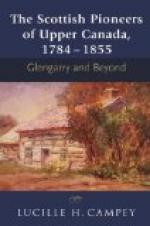Smallpox indeed played a very important part in the historical development of western North America. Prior to 1780 the Amerindian tribes between the upper Mississippi and the Rocky Mountains, and between the Saskatchewans and the Missouri, were numerous and warlike. At first, about 1765, they received in very friendly fashion the pioneer British traders and French Canadians who attempted to resume the fur trade where it had been dropped by the French monopolists in 1760. But fifteen years afterwards, enraged at the violence and wrongdoing of the British and Canadian traders, and maddened by strong drink, they were planning a universal massacre of the whites, when suddenly smallpox (introduced by the Spaniards into New Mexico) came on them as a scourge, which destroyed whole tribes, and depopulated much of western North America.
Alexander Henry had many adventures with the bison of the plains. Here is one of them.
“Just as I came up to him at full speed and prepared to fire, my horse suddenly stopped. The bull had turned about to face my horse, which was naturally afraid of buffaloes, and startled at such a frightful object; he leaped to one side to avoid the bull. As I was not prepared for this I was pitched over his head, and fell within a few yards of the bull’s nose; but fortunately for me he paid no more attention to my horse than to me. The grass was long, and I lay quiet until a favourable opportunity offered as he presented his placotte. I discharged both barrels of my double gun at him; he turned and made one plunge toward me, but had not time to repeat it before he fell, with his nose not more than three paces off.... I had to return on foot as my horse had bolted.”
At this place—near the Red River (the season September)—the country swarmed with big game such as North America will never see any more: enormous numbers of bison, of wapiti or Canadian red deer, moose or elk, prong-buck, and of grizzly bears and black bears who followed the herds to attack them. The rivers swarmed with otters and beavers. The ground along the banks of the river was worn into a smooth, hard pavement by the hoofs of the thousands of buffaloes. Racoons, red foxes, wolves, and pumas frequented the bush country and the chumps of forest. A large white wolf, prowling rather imprudently, came within a few yards of Henry, and was shot dead. “We observed on the opposite beach no fewer than seven bears drinking all at the same time. Red deer were whistling in every direction, but our minds were not sufficiently at ease to enjoy our situation.” Large flocks of swans (Cygnus columbianus) rose out of the Red River apparently in a state of alarm and confusion, possibly caused by the many herds of buffaloes rushing down to the river to drink. At night everything was quiet except the bellowing of buffaloes and the whistling of red deer. “I climbed up a tall oak at the entrance of the plain, from the top of which I had an extensive view of the country. Buffalo and red deer were everywhere in sight passing to and fro.”




